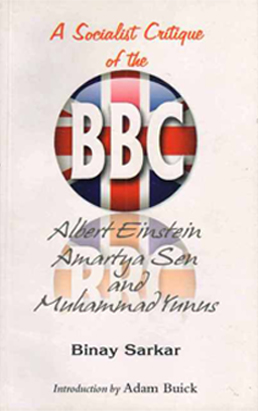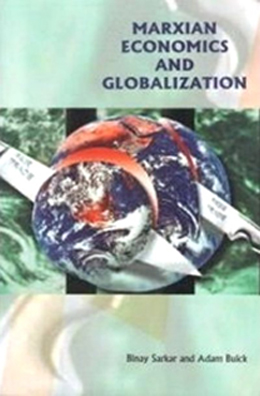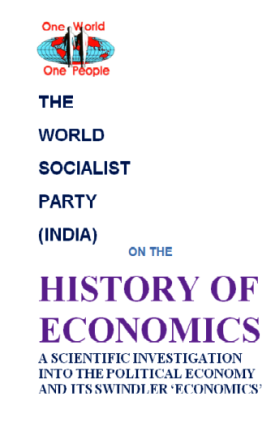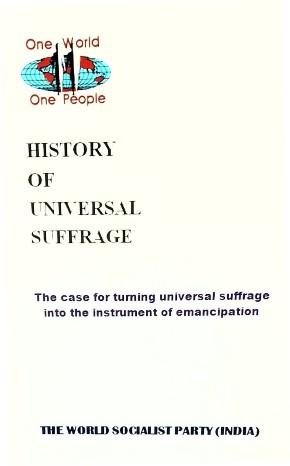Articles
Yes, Greta, change is necessary but radical change
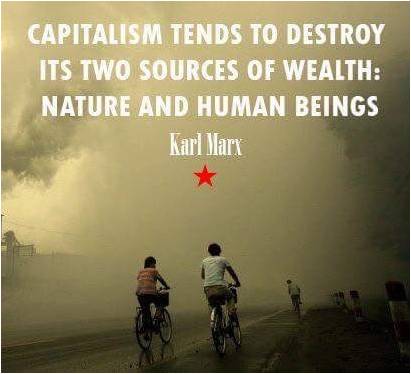
On 5 December 2018 social and print media published news of a press conference at the United Nation’s COP24 climate change conference held in Katowice, Poland. The news and a short video rapidly became viral on social media with large viewership and shares. The centre of attraction was a brave and articulate young girl, Greta Thunberg aged just 15, a young climate activist from Sweden. Sitting by the side of the UN general secretary, she uttered some rousing truths which at the first instance made us delighted. She blamed all political leaders of past and present generations for the catastrophic climate changes which have brought the whole human civilization and nature that environs us to the brink of disaster We could not but only congratulate her courageous words, ‘We have not come here to beg the world leaders to care for our future. They have ignored us, they ignored us in the past and they will ignore us again. We have come here to let them know that change is coming whether they like it or not.’
Yes we understand that a change is necessary. A radical change is essential in our thinking
Joy of Freedom
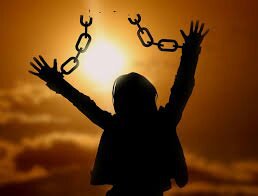
Once the workers of the world take over parliaments by electing a majority of socialist MPs (actually Socialist delegates) mandated to pronounce: Annulment of all property and territorial rights whereby all that is on and in the Earth becomes the common heritage of the whole humanity, just imagine how great will be the massive popular impact of this revolutionary event all over the world.
People will not just remain sitting beside televisions at home simply watching the results.
Marxism
Conceptions and definitions are the basis of all thought processes. We call our method "Marxism" because the fundamental theoretical work was in the main accomplished by Marx. Three interrelated principles--the materialist conception of history, the class struggle and the theory of surplus value - worked together to initiate this method.
Through long and persistent intellectual and organizational work, Marx made his remarkable declaration in 1859 in the Preface to his A Contribution to the Critique of Political Economy as follows:
"My inquiry led me to the conclusion that neither legal relations nor political forms could be comprehended whether by themselves or on the basis of a so-called general development of the human mind, but that on the contrary they originate in the material conditions of life, the totality of which Hegel, following the example of English and French thinkers of the eighteenth century, embraces within the term "civil society"; that the anatomy of this civil society, however, has to be sought in political economy. The study of this, which I began in Paris, I continued in Brussels, where I moved owing to an expulsion order issued by M. Guizot. The general conclusion at which I arrived and which, once reached, became the guiding principle of my studies can be summarised as follows.
"In the social production of their existence, men inevitably enter into definite relations, which are independent of their will, namely relations of production appropriate to a given stage in the development of their material forces of production. The totality of these relations of production constitutes the economic structure of society, the real foundation, on which arises a legal and political superstructure and to which correspond definite forms of social consciousness. The mode of production of material life conditions the general process of social, political and intellectual life. It is not the consciousness of men that determines their existence, but their social existence that determines their consciousness. At a certain stage of development, the material productive forces of society come into conflict with the existing relations of production or - this merely expresses the same thing in legal terms - with the property relations within the framework of which they have operated hitherto. From forms of development of the productive forces these relations turn into their fetters. Then begins an era of social revolution. The changes in the economic foundation lead sooner or later to the transformation of the whole immense superstructure.
"In studying such transformations it is always necessary to distinguish between the material transformation of the economic conditions of production, which can be determined with the precision of natural science, and the legal, political, religious, artistic or philosophic - in short, ideological forms in which men become conscious of this conflict and fight it out. Just as one does not judge an individual by what he thinks about himself, so one cannot judge such a period of transformation by its consciousness, but, on the contrary, this consciousness must be explained from the contradictions of material life, from the conflict existing between the social forces of production and the relations of production. No social order is ever destroyed before all the productive forces for which it is sufficient have been developed, and new superior relations of production never replace older ones before the material conditions for their existence have matured within the framework of the old society.
Ascendance/Decadence of Capitalism
Capitalism was progressive during its ascendance i.e., in its formative stage. During this phase all its necessary formations and reformations were progressive, even though it emerged having been drenched in sweat and blood. Consequently, both the capitalist and working classes were sprouting in their decisive point in time.
Marx Foresaw
“The bourgeoisie cannot exist without constantly revolutionising the instruments of production, and thereby the relations of production, and with them the whole relations of society,” wrote Marx and Engels in 1848 in Manifesto. Capital as “self-expanding value” (V = c + v + s, where V = Value, c = constant capital, v = variable capital and s = surplus value) constantly coerces its personified functionaries, the capitalists, to look for maximum profit by raising the rate of surplus value (exploitation) i.e., by raising ‘s/v’ that pushes up the organic composition of capital or ‘c/v’, which reciprocally (tendentiously though) reduces the rate profit ‘s/(c + v)’.
Marx's alternative
“It is true that Marx did not believe in drawing up recipes for the cookshops of the future, but he did describe the basis of the society he thought was going to replace capitalism: “an association of free men, working with the means of production held in common” (chapter 1 of Capital); “a co-operative society based on the common ownership of the means of production” (Critique of the Gotha Programme); “abolition of private property”, “the Communistic abolition of buying and selling”, “the conversion of the functions of the State into a mere superintendence of production” (Communist Manifesto); “abolition of the wages system” (Value, Price and Profit). In short, a classless, stateless, moneyless, wageless society based on the common ownership of the means of production.” – cited by Adam Buick, Socialist Standard, November 2012
“Every atom of surplus value and capital, for Marx, is the result of theft. The issue is slavery – not the level of slave rations. In short, reform of capitalism is not the answer. Marx was unequivocal: capitalism must be ended.” - Beyond Capital, Marx’s Political Economy of the Working Class, Michael A. Lebowitz
The Fear of Marx
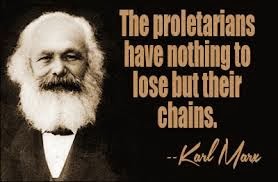 Among some, charges of racism are leveled against any who criticise the black president of the USA in the same way that charges of anti-semitism are used against anyone who is critical of Israel’s Zionist polices (This is not to deny the racism is directed against Obama.) Our opposition has nothing to do with race. It stems from class differences. To call Obama a liberal or a socialist, as many do, is farcical and incredulous.
Barack Obama identifies allies himself with America’s ruling class. Whatever minutia one uses to differentiate the lesser and greater evil is akin to splitting hairs. The Democratic Party and the Republican Party are not mortal enemies, as portrayed in the corporate media; they are in collusion against the world’s working class and the poor. Together, they are raping and pillaging the Earth and repressing workers through economic austerity.
Among some, charges of racism are leveled against any who criticise the black president of the USA in the same way that charges of anti-semitism are used against anyone who is critical of Israel’s Zionist polices (This is not to deny the racism is directed against Obama.) Our opposition has nothing to do with race. It stems from class differences. To call Obama a liberal or a socialist, as many do, is farcical and incredulous.
Barack Obama identifies allies himself with America’s ruling class. Whatever minutia one uses to differentiate the lesser and greater evil is akin to splitting hairs. The Democratic Party and the Republican Party are not mortal enemies, as portrayed in the corporate media; they are in collusion against the world’s working class and the poor. Together, they are raping and pillaging the Earth and repressing workers through economic austerity.
Hammer Sickle Myth
 Hammer-sickle logo!
Hammer-sickle logo!
The hammer-sickle logo signifies class collaboration, i.e., worker peasant unity, that derives from the Leninist legacy and in no way from Marxian tradition that evolved through the three fundamental interrelated principles of class struggle, the materialist conception of history and the labour theory of value, all of which have been deliberately distorted by Lenin and his followers including the entire rank-and-file of the leftist, rightist, centrist parties, groups and individuals, and the all-pervading propaganda machine of capital – ‘friends’ and foes alike. Marx and Engels emphatically espoused in the Communist Manifesto,
Petty capitalists
The capitalist relations of production for profit – i.e., wage-labour/capital relations – employer/employee relations have absorbed most of the world’s per-capitalist production for use - no matter how big or small the enterprises are. Pre-capitalist relations of production have been replaced with capitalist ones. Nowadays even the small ones employ partly wage-labour alongside their own family labour and self-employment – marginal ventures notwithstanding. They are modern petty-capitalist reactionary owners – farmers and firm owners and shop-keepers, not pre-capitalist peasants, artisans, craft and caste guilds, traders, merchants and usurers of the Middle Ages and up to the industrial revolution at any rate.
The point here is how we should determine their class. Note that they are not producing pre-capitalist simple commodities (production for use as C1 – M – C2 where C2 = C1) not under feudal tenure, nor under the erstwhile guild system, but under global capitalism (production for profit as M – C – M' where M' (M + m) ? M). They are producing commodities. Peasant farming has got transformed into capitalist farming having been divided into exploiter and exploited classes – farm owners and wage labourers – catering to needs of the world market. Likewise, the artisanship and the guild master / journeymen relations have turned into capitalist ones – few raising themselves up to the capitalist class while most dropping into the ranks of sellers of labour power producing profit for their employers. Production for use has given way to the production for profit. Thus the small farms and businesses belong in the petty capitalist class who produce commodities to be sold on the world market with a view to profit.
Our criterion of distinguishing classes pertains to the Marxian materialist principle - relations of production. The capitalist class comprises those who employ workers in order to exploit them with a view to profit by means of their ownership and/or control over means of production and distribution. The working class comprises those who sell their labour power – any ability to work in exchange for a wage or salary in order to survive under compulsion of being exploited. The capitalist class possesses, but doesn’t produce. The working class produces, but doesn’t possess.
Further, we take into account the fulcrum of the system – the dominant relations of production which overshadow all other past relations to determine our present perspective. In addition, under capitalist competition one capital kills many; big capitals kill small ones. The process is going through continuous concentration and centralization whereby the very existence of petty capitalist owners is definitely at stake. Capitalist competition leads to concentration of wealth in the form of “an immense accumulation of commodities” on the one hand and poverty, pauperism and misery on the other. The great majority of the small farmers and petty firm owners are eventually being driven out of the market with their constantly decaying status as owners of some means of production, and getting transformed into job seekers – the unemployed – the "reserve army of labour" (Engels) beside other workers. And for that matter, finally they will have to take position in the world socialist movement; they will gravitate towards the total movement getting integrated into the revolutionary class-for-itself.
Binay Sarkar
24 October 2013
THE BUYING AND SELLING OF LABOUR POWER
The buying and selling of labour power is the historically distinctive characteristic – the differentia specifica of the capitalist mode of production. This heralds self-expansion of value; its change occurs not in money itself, nor in the second act of circulation (C – M'), but in the commodity bought by first act, M – C. The change originates in the use-value of the commodity, i.e., in its consumption. Moneybags find within the sphere of circulation a commodity whose use-value possesses the peculiar property of being a source of value – labour-power. Labour-power or capacity for labour means the aggregate of mental and physical capabilities existing in a human being, used to produce a use-value of any kind.
What Do We Mean By Revolution?
 ‘The word Revolution, which we Socialists are so often forced to use, has a terrible sound in most people's ears, even when we have explained to them that it does not necessarily mean a change accompanied by riot and all kinds of violence, and cannot mean a change made mechanically and in the teeth of opinion by a group of men who have somehow managed to seize on the executive power for the moment. Even when we explain that we use the word revolution in its etymological sense, and mean by it a change in the basis of society, people are scared at the idea of such a vast change, and beg that you will speak of reform and not revolution.’
‘The word Revolution, which we Socialists are so often forced to use, has a terrible sound in most people's ears, even when we have explained to them that it does not necessarily mean a change accompanied by riot and all kinds of violence, and cannot mean a change made mechanically and in the teeth of opinion by a group of men who have somehow managed to seize on the executive power for the moment. Even when we explain that we use the word revolution in its etymological sense, and mean by it a change in the basis of society, people are scared at the idea of such a vast change, and beg that you will speak of reform and not revolution.’
Socialist Revolution
You know that a successful socialist revolution to happen nowadays two basic conditions must mature – 1) subjective i.e. revolutionary will and organisation of the immense majority of the working class world over and, 2) objective i.e. material productive abundance for all. Unceasing evolution of technology leading to artificial intelligence – robotics and automation – has revolutionized the forces of production to the extent of making a leisure society on hand
Capitalism and Revolution
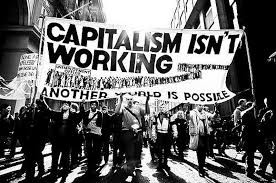 Capitalist
Capitalist
“Capital is a collective product. … Capital is, therefore, not a personal, it is a social power.” – Marx and Engels,
Manifesto of the Communist Party, Moscow, 1977, p. 51
Marx discerned that capital “presents
itself as an independent substance” –
www.marxists.org/archive/marx/works/1867-c1/ch04.htm
“Capital, also, is a social relation of production. It is a bourgeois production relation, a production relation of bourgeois society.” (Marx,
Wage Labour and Capital, pp.27-32)
Devastation in Kerala
 Devastation in Kerala
Devastation in Kerala
Janet Surman of the Socialist Party of Great Britain has sent the following statement on the horrific floods and consequent devastation in the state of Kerala for publication. According to her this cannot be isolated from the many other such weather catastrophes occurring globally with greater frequency. When talking of climate catastrophe the political discourse must be global. The necessary action must be global. All events need to be seen, not separately, but as parts of the whole. – the World socialist party (India).
Politics
Almost a month on from the horrific floods and consequent devastation in the state of Kerala, south western India, it is interesting to look back at the commentary being put out by Indian writers at the time. There is blaming and shaming of different varieties, of different parties, with different emphasis depending on the main points raised by each individual commentator. This particular incident though, however serious and shocking
HUMAN RELATIONSHIP IN SOCIALISM
 By nature “human nature” is gregarious, cooperative. It is the class division of society that has produced the ongoing alienation, competition and anti-Nature behaviour. It has criminalized society. Socialism is the negation of capitalism – the last class society in history.
By nature “human nature” is gregarious, cooperative. It is the class division of society that has produced the ongoing alienation, competition and anti-Nature behaviour. It has criminalized society. Socialism is the negation of capitalism – the last class society in history.
In Socialism, gangsters’ cliques will lose their socio-economic breeding grounds
From Planetary Community to Universal Community
 Socialist Freedom
Socialist Freedom
The workers of the world are yet to unite to accomplish their over-a-century-long pending task of overcoming what Thorstein Veblen called “the predatory phase” of human development. They have yet to move on to the phase of “an association, in which the free development of each is the condition for the free development of all” (Karl Marx and Frederick Engels), by transforming human society from “a planetary community of production and consumption” (Albert Einstein) into a Universal Community of Scientific Beings – star-trekking beings. With the disappearance of classes from within liberated humanity, humans will leave behind their prehistory and enter into the realm of free history, as Marx envisaged.
Important Document in Socialist History
Karl Marx's Declaration of Principles
A hundred and twenty four years ago in May 1880, four men met in the study of Marx's house in North London: Karl Marx, Frederick Engels, Paul Lafargue (who was still then living in London) and Jules Guesde, who had specially come over from France.
Guesde (pronounced "Ged") had played a key role in persuading a conference of French political and trace union organizations in Marseilles in October 1879 to adopt "the collective ownership of the soil, sub-soil, instruments of production, raw materials" as the aim of "the Federation of the Party of Socialist Workers of France". He was now in London to get Marx"s help in drawing up a declaration of principles of this new party.
Marx dictated to Lafargue, who acted as secretary of the meeting, the following preamble to a list of immediate demands prepared by Guesde for the elections of 1881. Engels, in his letter to Edward Bernstein on October 25, 1881, wrote about the preamble, "A masterpiece of cogent reasoning, calculated to explain things to the masses in a few words."
read more >>
Uprising and Universal Suffrage
https://www.marxists.org/archive/marx/works/1895/03/06.htm
The highest form of the state, the democratic republic, which under our modern conditions of society is more and more becoming an inevitable necessity, and is the form of state in which alone the last decisive struggle between proletariat and bourgeoisie can be fought out - the democratic republic officially knows nothing any more of property distinctions. In it wealth exercises its power indirectly, but all the more surely.
Frederick Engels 1895
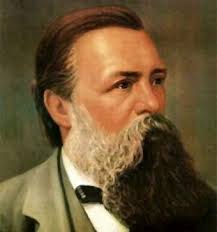 Introduction to Karl Marx's
Introduction to Karl Marx's
The Class Struggles in France 1848 to 1850
read more >>
Marxian Socialism
"The unfaltering presentation of Marxian Socialism does not then make rapid strides anywhere and least of all amongst the rural communities. Yet experience has infallibly shown that this is the only possible road to victory. Compromise may bring a big following, a deluded following, which, once having but superficially realized the nature of the deception, will turn and rend its erstwhile gods in an agony of reaction. History has shown, all too clearly, the fatal character of any such procedure. The Socialist Party cannot afford to ignore the great mass of agrarian workers, neither dare we swerve to the right or left in delivering our message. A PSEUDO-SOCIALISM IS ANTI-SOCIALISM." - Alf Budden, The Slave of the Farm, being letters from Alf Budden to a fellow farm slave and comrade in revolt, Calgary, Alta. August, 1914
The Bolshevik coup d’état in Russia: 1917—1921
Select and revised edition of an article written between February and May 1990 and published in the journal Introducing Communist Review, Calcutta, May 1990, the article was written by Binay Sarkar, Editor during a period when the Lal Pataka group was becoming aware about Bolshevism to be an utter distortion of Marxism. And for that matter, the group was severing relations with the left-communist milieu entirely, and with the International Bureau for the Revolutionary Party (the CWO, UK and the PC Int. (BC), Italy particularly). Since mid-eighties the Socialist Party of Great Britain came into contact with Lal Pataka through their journal the Socialist Standard and correspondence regularly. The group then reorganized themselves as the Marxist Internationalist Correspondence Circle towards further international opening. Thereafter in association with the Socialist Party of Great Britain the group finally turned themselves into the World Socialist Party (India) in March 1-3, 1995.
read more >>
Lenin, theorist of nationalism
Lenin's very notion that "imperialism is the highest stage of capitalism" supposes that one nation exploits another, so requiring a "national liberation" movement for the subject nation, which leads the working class of two different countries into a game of slaughtering each other. But the working class has no nation, only a world to win.
We know that, historically, unless a particular class monopolises the means of production and distribution and forces the rest of the people to sell their labour power, no capitalist production is possible. Private property is monopoly. Coupled with the division of labour it is the basis of commodity production as of exchange, money, the market, etc.
But to Lenin monopoly was not this class monopoly but the mere concentration and centralisation of capital. According to Marx, the very existence of capitalist society involves both monopoly (in this sense) and competition, which nullifies Lenin's supposition that such monopoly is only a feature of "imperialism":
read more >>
Class, not nation: a world to win
Nationalism, integrationist or separatist, in spite of and against one another, breeds patriotism that feeds on contempt for and hostility towards people in others, whereunder fratricidal strives are inevitable. Instances abound around. But these strives, in essence, are expressions of the dynamic of a system that feeds on profit.
"Independence", "My country", "Sovereignty", "Self-sufficiency", "Indigenous growth", "Prosperity", "Peace" et al pertain to the ideology of nationalism that forestalls class-consciousness.
This ideology speaks in terms of "common bonds" - race, religion, language, economic interests - to define the nation-state. But such homogeneity is conspicuously absent in almost all the 195 countries1 on our planet. And all nations are class-divided.
read more >>
Class Not People
The concept of “people” comprises the entire population (citizens including their young) of a country or nation bringing about its exploiting and exploited classes – the ruling and the ruled – altogether on the same line of organization and action – a class-collaborationist confusion. As a matter of fact it conceals classes, blurs class consciousness, obliterates class relations – antagonisms and struggles, and hides class exploitation and class oppression. A "people" does not, and cannot, exploit or oppress another "people" anyway.
read more >>
NOT A WOMEN QUESTION, BUT A CLASS QUESTION
[Reply to: wwo@brain.net.pk Re: WWO Pay Tribute to Women Of the World]
In the present class divided society women too are divided into classes, which is why you are recognizing yourselves properly as working women, as I understand. Working women belong in the working class who own or control little but their only means for survival - their labour power, i.e., their ability to work (unskilled or skilled) - to be sold as a commodity in the labour market (capitalist employment) for a subsistence called wage or salary.
read more >>
Women and socialism
Sexism is a word that has entered our vocabulary only fairly recently although the concept to which it refers has been around a lot longer. It means discrimination against women for reasons of gender alone. What it means in practice can best be illustrated by an outline of what many women in recent years have seen as the female role in contemporary society.
read more >>
WSP India's manifesto seems to be ready since March 1995. What is the progress in the last 17 years?
Ans: During the last seventeen years the party has numerically decreased from 17 to 7 (and some supporters) owing to mainly religion factor. Our party doesn’t allow its members to actively participate in religious rites. Anyway, I do appreciate your concern about our numbers, perhaps!
read more >>
Marx and The Dictatorship of The Proletariat
Hal Draper
Summer 1962
read more >>
What's wrong with using Parliament?
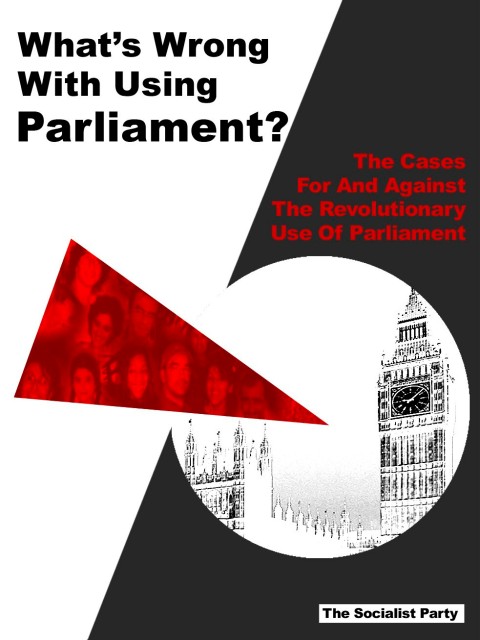
The cases for and against the Revolutionary use of Parliament
(Written and Published by Socialist Party of Great Britain)
read more >>
Consciousness
Consciousness can sometimes appear further advanced than the contemporary empirical conditions, so that in the struggles of a later epoch one can refer to earlier theoreticians as authorities." – Marx and Engels, The German Ideology, Marx Engels Collected Works, Vol. 5, Progress Publishers, Moscow 1976, p. 83. Also see: https://www.marxists.org/archive/marx/works/1845/german-ideology/ch01d.htm
“Men make their own history, but they do not make it just as they please; they do not make it under circumstances chosen by themselves, but under circumstances directly encountered, given and transmitted from the past. The tradition of all dead generations weighs like a nightmare on the brains of the living. And just as they seem engages in revolutionizing themselves and things, in creating something that had never yet existed, precisely in such periods of revolutionary crisis they anxiously conjure up the spirits of the past to their service and borrow from them names, battle cries and costumes in order to present the new scene of world history in this time-honored disguise and this borrowed language.” – Marx, The Eighteenth Brumaire of Louis Bonaparte, Marx Engels Selected Works, Vol. 1, Progress Publishers, Moscow1969, p. 398, Also see: https://www.marxists.org/archive/marx/works/1852/18th-brumaire/ch01.htm
Organize without leaders!

It is for sheep someone is required to lead them, not for Man. Modern men are not sheep; it is the corrupted and rotten politics of today, which makes them that way. See the provocative picture of British Parliament House with sheep outside.
read more >>






 Capitalist
Capitalist 
 By nature “human nature” is gregarious, cooperative. It is the class division of society that has produced the ongoing alienation, competition and anti-Nature behaviour. It has criminalized society. Socialism is the negation of capitalism – the last class society in history.
By nature “human nature” is gregarious, cooperative. It is the class division of society that has produced the ongoing alienation, competition and anti-Nature behaviour. It has criminalized society. Socialism is the negation of capitalism – the last class society in history. Socialist Freedom
Socialist Freedom 


